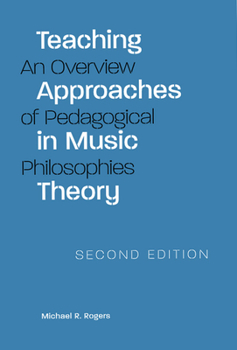Teaching Approaches in Music Theory: An Overview of Pedagogical Philosophies
Select Format
Select Condition 
Book Overview
Drawing on decades of teaching experience and the collective wisdom of dozens of the most creative theorists in the country, Michael R. Rogers's diverse survey of music theory--one of the first to comprehensively survey and evaluate the teaching styles, techniques, and materials used in theory courses--is a unique reference and research tool for teachers, theorists, secondary and postsecondary students, and for private study. This revised edition of Teaching Approaches in Music Theory: An Overview of Pedagogical Philosophies features an extensive updated bibliography encompassing the years since the volume was first published in 1984.
In a new preface to this edition, Rogers references advancements in the field over the past two decades, from the appearance of the first scholarly journal devoted entirely to aspects of music theory education to the emergence of electronic advances and devices that will provide a supporting, if not central, role in the teaching of music theory in the foreseeable future. With the updated information, the text continues to provide an excellent starting point for the study of music theory pedagogy.
Rogers has organized the book very much like a sonata. Part one, "Background," delineates principal ideas and themes, acquaints readers with the author's views of contemporary musical theory, and includes an orientation to an eclectic range of philosophical thinking on the subject; part two, "Thinking and Listening," develops these ideas in the specific areas of mindtraining and analysis, including a chapter on ear training; and part three, "Achieving Teaching Success," recapitulates main points in alternate contexts and surroundings and discusses how they can be applied to teaching and the evaluation of design and curriculum.
Teaching Approaches in Music Theory emphasizes thoughtful examination and critique of the underlying and often tacit assumptions behind textbooks, materials, and technologies. Consistently combining general methods with specific examples and both philosophical and practical reasoning, Rogers compares and contrasts pairs of concepts and teaching approaches, some mutually exclusive and some overlapping. The volume is enhanced by extensive suggested reading lists for each chapter.





